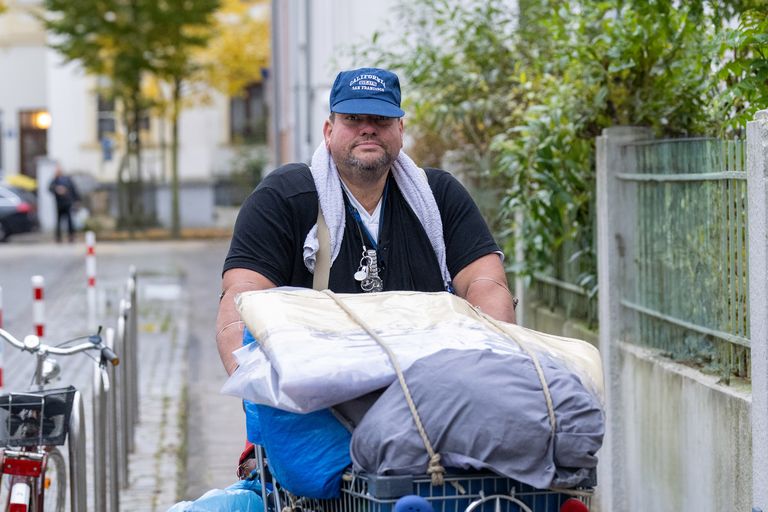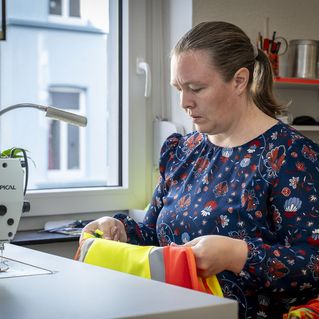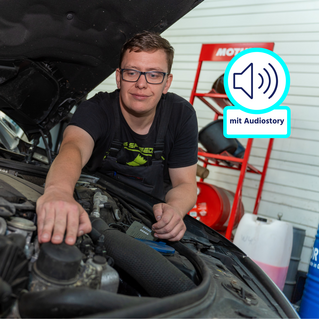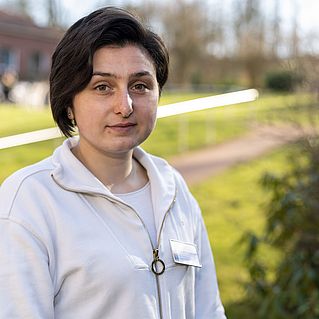The first two years were tough, says Jens. "I had to learn what winter and the other seasons felt like outside at night," he says, "I hadn't even camped until then." The 52-year-old has now been homeless for almost twelve years. He doesn't want to go back to a permanent home.
"I'm making a record," says Jens, and he really means it: the ground for his night's lodgings has to be hard and level. Made of marble, for example. He spreads a blanket on top and, because he sleeps on his side, pushes an oval cushion under his pelvis. He covers himself with more blankets. How many depends on the weather. "The important thing is that my body heat creates a bubble of warmth underneath," he explains, "then I can sleep wonderfully." Jens also applies the onion principle to his clothing. He wears up to four pairs of jogging trousers on top of each other and just as many jumpers. In snow and rain, he adds a poncho. "I don't use jackets," he says, "they don't work well for heat regulation." In winter, he puts two thin socks and a thermal sock over his feet. This means he doesn't even wear sturdy shoes when it's dry. Jens feels more comfortable in sandals.
But if you have to cope outdoors, you need more than just knowing the right equipment, says Jens: "You need human maturity to keep calm even in stressful situations." It is also important to act with foresight. This means organising your strength, knowing the weather forecast and sounding out the options for the next few nights. Jens changes his sleeping place frequently, "otherwise I'm too easy to work out". Always being in the same place and visible to people can be dangerous: Homeless people not only experience rejection, but increasingly also violence.
There are currently around 80 homeless people in Bielefeld, estimates Leonhard Wohlfahrt, head of the Bethel social services in Bielefeld's Viktoriastrasse. Just a few years ago, there were only half as many. The reasons for the increase: less and less affordable housing and refugees entering the housing market. In fact, around 600 people - 500 men and 100 women - are registered as homeless with the social services. They have no fixed abode, but only very few of them sleep outside at night like Jens. They stay in emergency accommodation or with family or friends.
Jens comes from a middle-class family, graduated from high school and played handball. When asked how he became homeless, Jens answers vaguely. He mentions complicated relationships with other people and problematic living conditions. He doesn't want to tell his whole story or reveal his real name. He just doesn't want to be too easily "analysed". However, his answer to the question of why he doesn't at least spend the nights in emergency accommodation is clear: "Because there are people there who, unlike me, take drugs or have an alcohol problem. Those are exactly the people who like to steal my wallet."
He prefers to spend the day in the Bethel social services centre, warming up and collecting his post. Jens showers and washes his clothes at Kava, Bethel's day centre for people in special circumstances, just a few hundred metres away. Wouldn't a real home with a solid roof over his head be better? Not at the moment, Jens thinks. Running a household is also very difficult for him because of his artificial knee joints, "and I've got used to living outside and being flexible".
Leonhard Wohlfahrt has long since shown him that there could be a suitable home for him, including customised support. He and his team are not giving up hope of a better life for Jens. "It's his free decision to live on the street," says Leonhard Wohlfahrt. "But maybe the moment will come when he says he can't go on. Then we'll be there to help him."
Text: Philipp Kreutzer | Photos: Christian Weische








